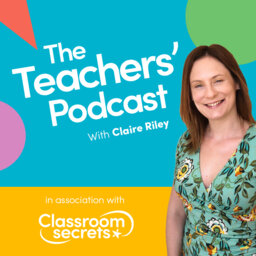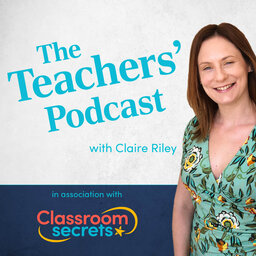Lee Peckover (Classroom Secrets): Finding a love of education in EYFS away from classroom
In this episode, Claire meets with Lee Peckover, a former primary school teacher and now Proofreading Manager at Classroom Secrets.
Lee discusses how he started his teaching journey, coaching Muay Thai boxing as a teenager, which ignited his interest in helping children learn. From that, he volunteered at a local primary school before gaining his teaching qualification and gaining experience from working in schools.
Unfortunately, due to personal circumstances, Lee made the decision to move out of teaching; he discusses his keen interest in Early Years Foundation Stage and the current developments within this area. Lee also discusses the changes and transitions between year groups and different phases of education – in particular, from Nursery to Reception and then the transition into Year 1 standardised learning.
Lee and Claire explore how Classroom Secrets has started to provide EYFS resources for teachers, and the inspiration behind the development and creation of these resources.
KEY TAKEAWAYS
- One of the main reasons for leaving teaching was the workload. Although it was a childhood dream and ambition, the strain and workload was having a detrimental effect on his health, which ultimately contributed to Lee’s decision to leave full-time teaching. Nonetheless, working at Classroom Secrets full-time, enables him to stay connected to the education sector, whilst studying for a Masters Degree. He has also begun to research and read materials towards a thesis, in order to move on to studying at a doctorate level.
- He is interested to see the transition from EYFS to Key Stage 1 – observing children move from play based learning to more formal instruction and standardised learning.
- Early Years enables children to become confident learners and enables the teacher to observe the passion and enjoyment children get from their school experience. This can be different to the learning that takes place in other Key Stages which is why Lee is so passionate about this particular learning stage.
- Lee notes that by the end of a child’s academic year in Early Years, they will have spent a quarter of their life in education.
- EYFS has a different curriculum – The Statutory Framework for EYFS is so different and broad to the National Curriculum for Key Stage 1 and 2. It is important for the curriculums and objectives to be different to allow children to explore in open-ended tasks.
- The opportunity to have open-ended investigations and play-based learning is not limited to Early Years and when adapted in Key Stage 2 it has worked very well.
- Early Years allows children the opportunity to learn constantly. They are learning by communicating with others and seeing the adult intervene in their learning. This setting also allows the adult to be removed from the situation, whilst learning continues.
- Early Years learning is focused on experience and play-based learning, rather than standardised, formal learning; freedom and choice should be given to all learners in every Key Stage instead of the adult planning every element of the lesson.
- There are many parts to consider in a lesson for Key Stage 1 and Key Stage 2, for example, input, mini plenary, second input, final plenary, key vocabulary etc., but in Early Years this has never happened - the learning is still taking place.
- It may be beneficial to take the play-based learning forward to Key Stage 1 and Key Stage 2 rather than have a trickle-down effect of; if Year 2 have formal learning then Year 1 should also be formal.
- It is important to give children a reason to want to learn in Early Years. The more frequently this is done, the more this will support learning for Key Stage 1. This opportunity allows children to then be excited for their learning in Year 1 as they have a purpose and understanding of why they are learning and what lies ahead.
- A longitudinal study that took place in New Zealand, measures the practitioner’s knowledge and the engagement of children in the tasks they were undertaking. Children should be given something they are already interested in and by allowing them the opportunity to finish something as well.
- The outcomes of the study showed that children who progressed the most were the ones who felt that sense of achievement, who knew they had completed something and who knew they have done something worthwhile.
- The opportunity to complete and finish the task/activity instead of moving on and cutting it short is important.
- It is important to give teachers and practitioners the choice of how they would like to use resources and enable them the ownership to be able to adapt them.
- A Scotland project focuses on age appropriateness of Early Years education. It pushes on a movement towards the idea of starting education at the age of seven. It looks at the impact of starting education at such a young age, right into adulthood and how much of an impact it has on a person’s mental well-being, as well as the pressure it puts on children.
- PISA tests, the outcomes and testing numeracy rates have shown Shanghai to be near the top including other Asian countries. It fails to be mentioned that learners in China also start formal education at the age of seven. Even at the age of seven, children do not start primary, they go to Kindergarten which is completely different and separate.
- Most successful education systems have children starting formal education at the age of six or seven, not four. It is important to consider the real long-term impact we are having on children by going the way that we are; by having children start formal education at such a young age.
- Lee wants to focus on the areas of what comes before phonics, understand what impact removing some of the formalisation has on children at that age group and how much it alleviates pressure further on in school.
- Early Years can be improved by improving funding. More staff and more importantly, better trained staff will have an incredible impact. It is important to ensure that adults can attend CPD courses.
- LIFE/Work Balance – reduce paperwork. Although some statements and tracking systems are not used; there is an undeniable pressure that if work and learning is not evidenced, it didn’t happen. More trust should be put on the professionals and their judgments who work with children on a day to day basis.
BEST MOMENTS
“I still have more free time than I did when I was teaching and I'm still healthier and having fewer seizures. It's a little bit of a worry for teachers I suppose”
“I think there's a maybe, maybe I'm completely wrong about this, but it's, in my own experience, the minute you start at a school, they kind of have an anticipation that male teachers are not necessarily going to be that keen to be in year one and reception.”
“I don't know how much you get that end of the year groups compared to early years, how much you get that just kind of unbridled joy where a child comes in and feels that they're playing, they almost don't even realise that they are learning.”
“There's no structure and yet they're still learning everything.”
“Working with a child who's three years old, that year they spend with you, taking them up to the age of four is a quarter of their life.”
“It's a quarter of that entire experience of the world. 25% of everything they know, has been potentially learned in that one year spell.”
“So you can teach children to tell the time by just having a constant focus on what time of the day is at that point. Knowing for themselves, what time they go for break and knowing sort of when the end of the day. So they constantly are aware of the time and telling time. You never then have to do lessons on it, but EYFS is kind of all that.”
“But you, often times you can remove the adult from the situation and the learning doesn't stop.”
“Giving them a reason to want to learn to read.”
“Not one of the resources that we've made so far has looked at just one outcome.”
“Confucius said that, 'real wisdom is knowing your own ignorance'”
“China starts formal education at age seven as well and it seems to just be completely overlooked.’”
“The board, are the ones where children's start their formal education at age six or at age seven.”
“Being open to finding new things and being really open minded to changing things and trying out different things I think is really important.”
“There's almost a pressure of people feeling that if it's not on paper or if it's not evidenced, then it didn't happen.”
“'How would you evidence that?', and I think the evidence is that the child now has learned something.”
VALUABLE RESOURCES
The Teachers’ Podcast: https://www.facebook.com/groups/TheTeachersPodcast/
Classroom Secrets Facebook: https://www.facebook.com/ClassroomSecretsLimited/
Classroom Secrets website: https://classroomsecrets.co.uk/
LIFE/work balance campaign: https://classroomsecrets.co.uk/lifeworkbalance-and-wellbeing-in-education-campaign-2019/
The movement in Scotland I reference without naming - Upstart Scotland: https://www.upstart.scot/
A consultant and blog I recommend for CPD etc - Alistair Bryce-Clegg: https://abcdoes.com/
The longitudinal study I reference - Wylie, Cathy. Competent Children at 6. Wellington: ERIC, 1998.
Another site and hashtag mentioned - EY Matters: https://www.eymatters.co.uk/
Other sources for further reading either referenced or recommended -
Neaum, Sally. What Comes Before Phonics Exeter: Learning Matters, 2017.
Bruner, Jerome S. The Culture of Education. Cambridge: Harvard University Press, 1996.
Laevers, Ferre. Making Care and Education More Effective Through Wellbeing and Involvement - Experiential Education. 1994
Gibbs, Graham. Learning By Doing. London: FEU, 1988.
Rogers, Sue. Rethinking Play and Pedagogy In Early Childhood Education. London: Routledge, 2011.
Siraj-Blatchford, I, K Sylva, S Muttock, R Gilden, D Bell. Researching Effective Pedagogy in the Early Years. Oxford: Department for Educational Studies, 2002
ABOUT THE HOST
Claire Riley
Claire, alongside her husband Ed, is one of the directors of Classroom Secrets, a company she founded in 2013 and which provides outstanding differentiated resources for teachers, schools, parents and tutors worldwide.
Having worked for a number of years as a teacher in both Primary and Secondary education, and experiencing first-hand the difficulties teachers were facing finding appropriate high-quality resources for their lessons, Claire created Classroom Secrets with the aim of helping reduce the workload for all school staff.
Claire is a passionate believer in a LIFE/work balance for those who work in education citing the high percentage of teachers who leave or plan to leave their jobs each year. Since February 2019, Classroom Secrets has been running their LIFE/work balance campaign to highlight this concerning trend.
The Teachers’ Podcast is a series of interviews where Claire meets with a wide range of guests involved in the field of education. These podcasts provide exciting discussions and different perspectives and thoughts on a variety of themes which are both engaging and informative for anyone involved in education.
 The Teachers' Podcast
The Teachers' Podcast


